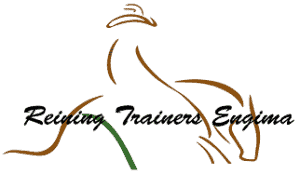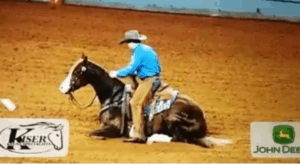NRHA Rules Score a Minus 1 ½
The issue of animal welfare is high on the agenda of competition associations as they work to clean up their public image to meet the modern day informed standards and social media scrutiny. Welfare statements and importantly their management can define an association in the eyes of the general public and those interested in sports.
Some associations are pro-active and progressive whereas others, like the National Reining Horse Association (NRHA), are just failing to deliver in their rules.
For many people, a horse show is a place where they see competition horses in the few minutes of showing under the judge. They see the big slides and fast spins and get enthralled in hype and entertainment; never seeing the alleged abuse that creates those circus tricks. With little access to the behind the scenes and the journey to the show ring, hiding the real experiences horses endure to become entertainment and instruments of success to the rider.
During discussions on the management of horse abuse at National Cutting Horse Association (NCHA) official events, it became evident that this is an association evolving to meet the welfare demands of horses. The discussion raised some serious contrasts between NRHA and NCHA and being miles apart.
On reading their respective current rule books, it became apparent that the NCHA write in a positive tone to ensure the improvement of their sport and image with precise definitions and responsibility. The NRHA is seemingly reliant on vague statements fraught with gaps to protect trainers and their staff from conviction.
While both NCHA and NRHA rules state they apply to ‘the show arena or on the show grounds,’ the NRHA rules fall well short when set beside those of the NCHA.
A couple of the major notable differences are:
NRHA Rule Book states Section 3. Abuse. (1) No one shall abuse or mistreat any horse in any manner whatsoever on the show grounds. Abuse is defined as an action, or failure to act, which a reasonably prudent person, informed and experienced in the customs, accepted training techniques, and exhibition procedures, would determine to be cruel, abusive, inhumane, or detrimental to the horse’s health. (2) Individuals will be subject to disciplinary procedures if it is determined that there was a willful abuse of the horse.
There is a reporting process with a $250.00 fee attached and the said complaint, with all required evidence, is heard by the NRHA in their hearing process. That process is to be reviewed at another time.
The NRHA is using vague statements and has many loopholes that can be taken advantage of. What is a reasonably prudent person, informed and experienced in the customs, accepted training techniques? Based on personal observation and what is seen on video in warm-up pens posted on our website. The excessive spurring, jerking reins with the full strength of the upper body of riders, continuous over bending, stopping and spinning starting or ending with the techniques above, then acceptable practices is an endless statement that embraces just about everything that otherwise is considered abuse outside of the reining culture.
On the opposite, the NCHA Rule Book states:
Any act that the general public would perceive to be a violation of 35b. This includes such acts occurring not only in the show arena but also those occurring anywhere on the show grounds–the warm-up area, practice pen or any other location. A. If show management or judge at any NCHA approved or sponsored event discovers inhumane treatment or abuse of a horse, they should immediately bar the responsible party and horse from further competition in the event and the judge will give a score of zero.
They have a $50.00 fee for filing complaints post events.
How gratifyingly proactive is the NCHA for these two primary reasons:
- The NCHA take action, at the event, immediately banning the responsible party rather than waiting weeks or months. A strong message of non-acceptance.
- The NCHA apply a measure of accountability for any act the general public perceives as a violation. A transparent and accountable process, ensuring the welfare of horses.
To go that extra step, the NCHA actually document what abuse is:
- Abuse includes excessive jerking, cueing, whipping, slapping, use of lip wire or similar device, or any other act intended to cause trauma or injury to a horse. Any act of abuse, or intent to abuse a horse, in the show arena or on the show grounds which could also potentially endanger the safety of other persons or animals will be dealt with in the strongest possible manner.
On attending both official events to see this first hand, the difference is apparent. The NCHA Show Manager is active in overseeing the warm-up pens and event walk-in, passing stern looks and guidance on what is not acceptable at the NCHA events. They are monitoring, better termed policing, with vigor to ensure the rules are abided by, and the welfare of horses is the highest priority through their actions.
In contrast at the NRHA event, the Show Manager was concerned with other duties of the show and animal welfare seemingly was low on the agenda as there were no active signs of policing or monitoring occurring. No rider was spoken to [disciplined] at the time of the incident to stop it, and there were many instances where intervention was required. The lack of documented abusive practices became apparent and reliance on vague statements was inadequate.
When is the NRHA going to install rules that deliver immediate and measurable accountability to all those trainers, competitors, and their help teams? Why do they continue to rely on ambiguous statements that make defining abuse of a horse a near impossible task for any complainant?
These are the questions that should be put to the NRHA.
© 2016 ReiningTrainers.com All Rights Reserved



 In the recent NRHA Futurity where Casey Deary’s young 3yo horse, ARC Gunna Mark Ya, collapsed to the ground after backing up so hard its legs gave way. There was immediate outrage around the world and the NRHA spin doctors went into overdrive to stop the meltdown as the video went viral. The trainer’s statement was plausible to those who needed to believe it and laughed at by others who had experience with horses.
In the recent NRHA Futurity where Casey Deary’s young 3yo horse, ARC Gunna Mark Ya, collapsed to the ground after backing up so hard its legs gave way. There was immediate outrage around the world and the NRHA spin doctors went into overdrive to stop the meltdown as the video went viral. The trainer’s statement was plausible to those who needed to believe it and laughed at by others who had experience with horses.